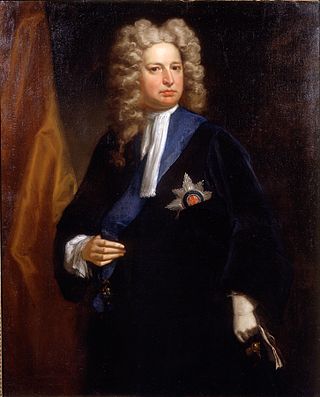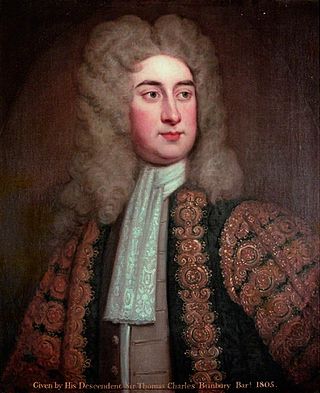
Robert Harley, 1st Earl of Oxford and Earl Mortimer, KG PC FRS was an English statesman and peer of the late Stuart and early Georgian periods. He began his career as a Whig, before defecting to a new Tory ministry. He was raised to the peerage of Great Britain as an earl in 1711. Between 1711 and 1714 he served as Lord High Treasurer, effectively Queen Anne's chief minister. He has been called a prime minister, although it is generally accepted that the de facto first minister to be a prime minister was Robert Walpole in 1721.
The Tories were a loosely organised political faction and later a political party, in the Parliaments of England, Scotland, Ireland, Great Britain and the United Kingdom. They first emerged during the 1679 Exclusion Crisis, when they opposed Whig efforts to exclude James, Duke of York from the succession on the grounds of his Catholicism. Despite their fervent opposition to state-sponsored Catholicism, Tories opposed exclusion in the belief inheritance based on birth was the foundation of a stable society.

This is a list of the principal Ministers of the Crown of the Kingdom of England, and then of the Kingdom of Great Britain, from May 1702, at the beginning of the reign of Queen Anne. During this period, the leaders of the ministry were Lord Godolphin and the Duke of Marlborough.

The first Parliament of the Kingdom of Great Britain was established in 1707 after the merger of the Kingdom of England and the Kingdom of Scotland. It was in fact the 4th and last session of the 2nd Parliament of Queen Anne suitably renamed: no fresh elections were held in England or in Wales, and the existing members of the House of Commons of England sat as members of the new House of Commons of Great Britain. In Scotland, prior to the union coming into effect, the Scottish Parliament appointed sixteen peers and 45 Members of Parliaments to join their English counterparts at Westminster.

The 2nd Parliament of Great Britain was the first British Parliament to actually be elected, as the 1st Parliament of Great Britain had been drawn from the former Parliament of England and Parliament of Scotland.
The Whig Junto is the name given to a group of leading Whigs who were seen to direct the management of the Whig Party and often the government, during the reigns of William III and Anne. The Whig Junto proper consisted of John Somers, later Baron Somers; Charles Montagu, later Earl of Halifax; Thomas Wharton, later Marquess of Wharton, and Edward Russell, later Earl of Orford. They came to prominence due to the favour of Robert Spencer, 2nd Earl of Sunderland and during the reign of Queen Anne, Sunderland's son, the 3rd Earl succeeded his father. Opponents gave them the nickname "the five tyrannising lords". Other figures prominent around the edges of the Junto include Sir John Trenchard and Thomas Tollemache.

The Harleyministry was the British government that existed between 1710 and 1714 in the reign of Queen Anne. It was headed by Robert Harley and composed largely of Tories. Harley was a former Whig who had changed sides, bringing down the seemingly powerful Whig Junto and their moderate Tory ally Lord Godolphin. It came during the Rage of Party when divisions between the two factions were at their height, and a "paper war" broke out between their supporters. Amongst those writers supportive of Harley's government were Jonathan Swift, Daniel Defoe, Delarivier Manley, John Arbuthnot and Alexander Pope who clashed with members of the rival Kit-Kat Club.
After the conclusion of the 1698 English general election the government led by the Whig Junto believed it had held its ground against the opposition. Over the previous few years, divisions had emerged within the Whig party between the 'court' supporters of the junto and the 'country' faction, who disliked the royal prerogative, were concerned about governmental corruption, and opposed a standing army. Some contests were therefore between candidates representing 'court' and 'country', rather than Whig and Tory. The Whigs made gains in the counties and in small boroughs, but not in the larger urban constituencies. After Parliament was dissolved on 7 July 1698, voting began on 19 July 1698 and continued until 10 August, with an order directing the new House of Commons to meet on 24 August 1698.
Robert Monckton was an English landowner and Whig politician who sat in the English and British House of Commons between 1695 and 1713. He took an active part supporting William of Orange in the Glorious Revolution, and was notable for his involvement in a number of exceptionally bitter and prolonged electoral disputes.

The Eleventh Parliament of Great Britain was the parliament of the Kingdom of Great Britain that sat from 31 May 1754 to 20 March 1761. It was assembled following the general elections held in April–May 1754.
Richard Bulkeley, 4th Viscount Bulkeley, of Baron Hill, Anglesey, was a Welsh Tory politician who sat in the House of Commons between 1704 and 1724. He was extremely hot-tempered and was involved in several personal and family disputes with local Whig leaders.

The 2nd Parliament of King William III and Queen Mary II was summoned by William III of England and Mary II of England on 6 February 1690 and assembled on 20 March 1690.

The 3rd Parliament of William III was summoned by William III of England on 12 October 1695 and assembled on 22 November 1695. It was the first election to be contested under the terms of the new Triennial Act passed in the previous Parliament which, amongst other things, limited the duration of the Parliament to 3 years. Its composition was 257 Whigs, 203 Tories and 53 others; Paul Foley, a Country Whig and member for Hereford, was installed as Speaker of the House of Commons.

The 5th Parliament of William III was summoned by William III of England on 26 December 1700 and assembled on 6 February 1701. The party political constitution of the new House of Commons was 249 Tories, 219 Whigs and 45 others, representing a significant swing in favour of the Tories. Robert Harley, the Tory member for Radnor, who had declined a post in William III's new ministry, was elected Speaker of the House.

The 6th Parliament of William III was summoned by William III of England on 3 November 1701 and assembled on 30 December 1701. Its composition was 248 Whigs, 240 Tories and 24 others; Robert Harley, the member for Radnor, was re-elected Speaker of the House of Commons.

The 1st Parliament of Queen Anne was summoned by Queen Anne of England on 2 July 1702 and assembled on 20 August 1702. Its composition was 298 Tories, 184 Whigs and 31 others, representing a large swing to the Tories since the previous election. Robert Harley, the member for Radnor, was re-elected Speaker of the House of Commons.

The 3rd Parliament of Great Britain was summoned by Queen Anne on 27 September 1710 and assembled on the 25 November 1710. Under the Triennial Act, the Parliament was due to expire, if not dissolved sooner, at the end of the term of three years from the first meeting. In the event it was actually dissolved on 8 August 1713.

The 4th Parliament of Great Britain was summoned by Queen Anne on 18 August 1713 and assembled on the 12 November 1713. It was dissolved on 15 January 1715 and would be Queen Anne's last Parliament.

The 5th Parliament of Great Britain was summoned by George I of Great Britain on 17 January 1715 and assembled on the 17 March 1715. When it was dissolved on 10 March 1722 it had been the first Parliament to be held under the Septennial Act of 1716.










